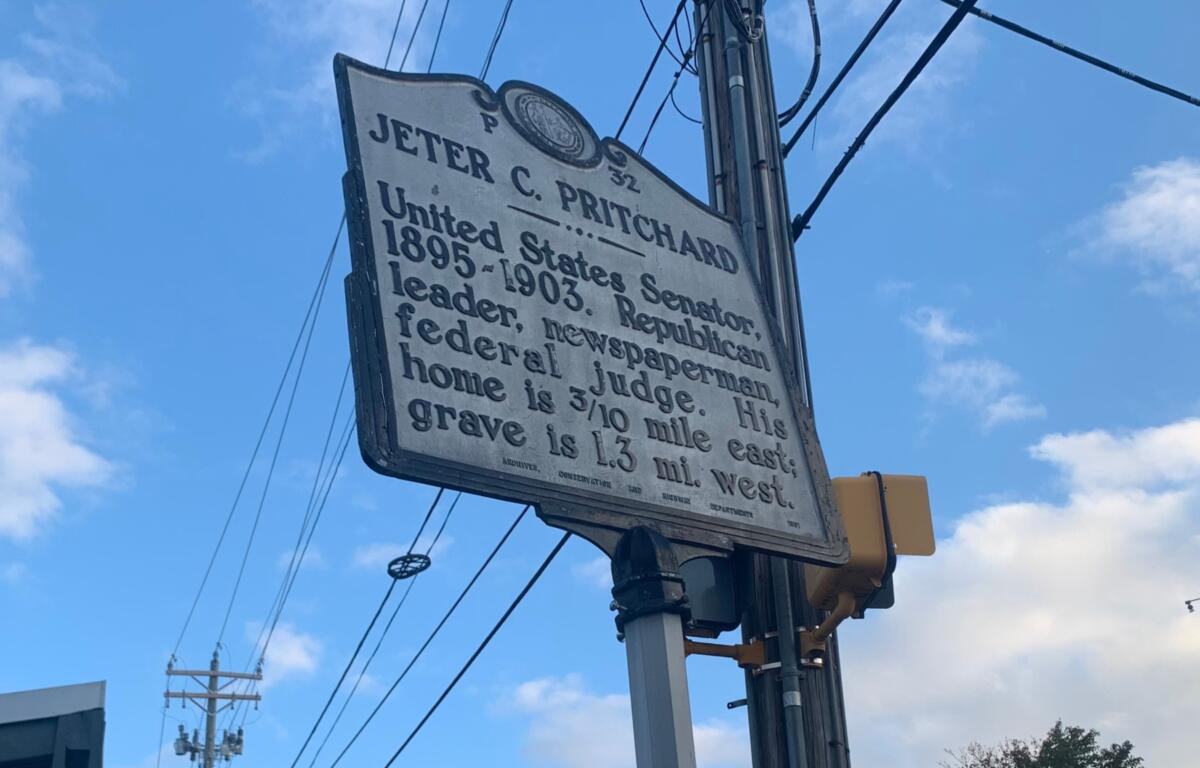EDITOR’S NOTE: Everyone has a story — some more well-known than others. Across Western North Carolina, so much history is buried below the surface. Six feet under. With this series, we introduce you to some of the people who have left marks big and small on this special place we call home.
Jeter C. Pritchard (1857-1921), a respected U.S. Court of Appeals judge and senator, who sponsored a bill to create Smoky Mountains National Park and partially funded the construction of Ridgecrest Conference Center, is buried in Riverside Cemetery in Asheville.
—–
Jeter Connelly (or Conley) Pritchard was born and raised in Jonesboro, Tennessee. His father, William H. Pritchard, who enlisted in the Confederate Army despite being seven years older than the maximum enlistment age, died after contracting a disease during the siege of Vicksburg. After the elder Pritchard succumbed to the illness in Mobile, Alabama, 12-year-old Jeter became an apprentice at the Jonesboro Herald and Tribune. Afterward, he was hired by the Union Flag and Commercial Advertiser.
While working for the press in his teen years, Pritchard attended Martins Creek Academy in Erwin, Tennessee.
At 17, Pritchard left home, getting a job at the Roan Mountain Republican in Bakersville, North Carolina. After a short period on staff, Pritchard became an associate editor and partial owner of the local newspaper.
Pritchard did not receive any formal higher education. Instead, he picked up some law books, studied them and passed the bar with the help of Col. Pender A. McElroy.
Pritchard then moved to the Madison County seat of Marshall, where he became affiliated with the Republican Party. He was chosen as an elector and elected to the N.C. State House of Representatives, all within the span of a few years. Pritchard served as a representative for three consecutive terms from 1885-93.
In the mid-1890s, Republican leaders met with the leaders of the Populist Party, which had a significant presence in North Carolina politics at the time. The goal was to align the parties, which Democrats dubbed the “fusion.” Pritchard was a strong advocate for unification, arguing that the parties would stand a better chance of winning public office against the Democratic supermajorities of the era if they worked together.
After the death of former governor and then Sen. Zebulon B. Vance, Pritchard was elected to fill the late Civil War governor’s seat in Washington. Pritchard was one of only three Republicans to attain that office in North Carolina between the end of the war and the 1970s. The only Republican from the South in that chamber, Pritchard resided in the U.S. Senate from 1895-1903.
While in the Senate, Pritchard was tapped as President William McKinley’s Southern informant, helping him understand the situation south of the Federal District. McKinley reportedly asked Pritchard to assume a cabinet position, which the Southern lawyer respectfully declined.
Most famously, Pritchard introduced a bill titled “Southern Forest Preserve,” which later became Great Smoky Mountains National Park. The congressional fight for the preserve lasted for three decades after Pritchard left office, eventually being enacted in 1931, partly because of efforts from fellow Ashevillean George Masa, a mountain photographer.
Despite Pritchard’s tentative truce with the Populists, the relationship crumbled on the national stage as he and the Populist’s leader and fellow N.C. Senator Marion Butler fought publicly. This conflict caused both men to lose their seats to Democratic candidates.
On June 1, 1904, Pritchard assumed the office of Fourth Circuit judge for the U.S. Court of Appeals, after having been appointed in April by President Theodore Roosevelt. A fellow Republican, Roosevelt likely chose Pritchard because he was the only prominent Southern Republican at the time. Democratic politicians controlled nearly all elected offices in the former Confederate states.
As an appeals justice, Pritchard famously wrote a writ of habeas corpus to convicted newspaper editor Josephus Daniels, who had been found guilty of contempt of court.
Pritchard was married three times, first to Augusta L. Ray in 1887. She died shortly thereafter. He then wed Melissa Bowman, who died in 1902. In 1903, he married Lillian E. Suam, who remained by his side until his death in 1921. Pritchard had five children: four boys and one daughter.
Pritchard was a primary financial backer for Ridgecrest Conference Center, a Baptist mountain retreat that stands just outside Black Mountain. His time and money resulted in enduring retreat accommodations for Christian campers to this day.
Pritchard was dubbed “Asheville’s distinguished citizen” in the April 11, 1921, issue of the Asheville Citizen. He was an active member at First Baptist Church of Asheville, a Free Mason and a Knight of Pythias. During World War I, he campaigned on behalf of the war bond effort in several Southern states.
In a tribute to Pritchard in the Asheville Citizen-Times on May 1, 1949, Douglass C. Brookshire wrote, “He was loved by all classes for the simple reason that he knew no classes. His contribution to the construction of Asheville was not one of cement and brick and stone. His building was done in the hearts of his fellow men.”
Pritchard died of pneumonia at 6 a.m. on Sunday, April 10, 1921, at Mission Hospital in Asheville. His funeral was at 3 p.m. the next day.
According to the April 11, 1921, edition of the Asheville Citizen, “Mayor Gallatin Roberts last night issued a proclamation requesting the suspension of all business for a period of 10 minutes beginning on the funeral hour.”
President Warren G. Harding sent his condolences to Pritchard’s widow, writing, “I have learned with deep regret of the death of Judge Pritchard, whom I held in great respect. Please accept assurance of very genuine sympathy and know that many of his countrymen feel a share in the great loss his death brings to his state and his country.” Harding’s message was published in the Asheville Citizen on April 11, 1921.


